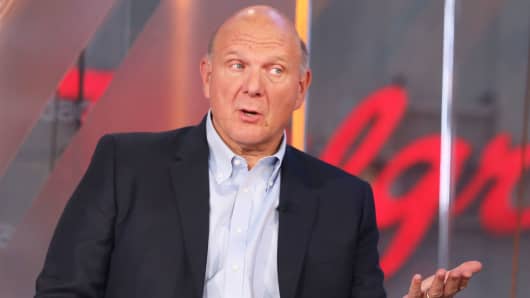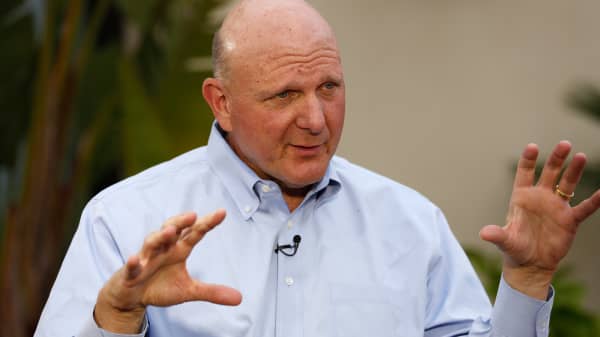Microsoft shares just broke the $90 barrier for the first time. The company now has a market capitalization around $700 billion.
Investors and the press have been quick to praise CEO Satya Nadella. And he deserves it. Nadella has abandoned Microsoft's ill-timed smartphone foray, stepped on the gas in cloud, and helped refresh the company culture.
On the day he was appointed CEO on February 4, 2014, the Microsoft stock price was around $36. It's almost tripled since.
I'm not surprised Nadella has done well. I predicted in August 2013, right after Steve Ballmer announced his plans to step down, that the Microsoft board would pick him as the next CEO because of the solid job he'd done leading the company's cloud and server businesses. He deserves enormous credit for his strong leadership in the past 4 years.
But Steve Ballmer deserves to remembered as a great Microsoft CEO who laid many of the seeds which have allowed the company's stock to explode since he left.
Ballmer is remembered as a big sweaty clownish figure because of videos like this. He's remembered as a buffoon for laughing at the iPhone in 2007. He's remembered for overpaying for acquisitions like aQuantive for $6 billion and trying to buy Yahoo for $44 billion (which, it turns out, would have netted some pretty attractive investment stakes).
Perhaps what irked investors the most about Ballmer is that the stock hardly moved under his watch. A week before he was named Bill Gates' successor in January 2000, Microsoft's stock hit an all-time high of $58 in the midst of the dot com craze. A year later, the stock was $21. When Ballmer agreed to step down as CEO in August 2013 at the urging of activist investor ValueAct and the rest of the Microsoft board, it was $32.
Therefore, over his 13-year tenure, the stock dropped, was flat, or slightly up -- depending on where you measure from. Investors complained Microsoft didn't keep up with the gains of its peers.
The day Ballmer said he'd leave Microsoft in 2013, the company's market cap was $245 billion. It's now $700 billion. That doesn't happen simply because a new CEO is more charismatic. A lot of these gains in market cap are because of Ballmer's stewardship.
He was a bridge between the old Microsoft, which was focused on desktop PC software, and the new Microsoft. There'd be no Microsoft Azure cloud or Office 365 without Ballmer's decision to invest in the cloud. The payback wasn't immediately obvious: Amazon Web Services hadn't yet shown up in a positive way on Amazon's financials, and other cloud-based software businesses like Salesforce were criticized for their lack of profits.
So these bets looked like signing up for a lifetime of negative gross margins for many investors. Investors gnashed their teeth at the prospect of customers no longer profitably buying Microsoft software on CDs.
Yet, Ballmer stayed the course. Nadella would not be the CEO of Microsoft today if Ballmer had not given him the resources he needed to lead the cloud group prior to his getting the top job.
Back in October 2007, Ballmer green-lit a $240 million investment in Facebook at a $15 billion valuation. Critics assailed it as a preposterously high valuation for a three-and-a-half year old company and yet another sign that Ballmer was spending recklessly like a drunken sailor. Although Microsoft later sold its stake and is no longer listed as a shareholder by FactSet, the bet was a great one: Facebook is now worth over $500 billion.
The activist hedge fund ValueAct reportedly pushed for Ballmer's ouster. They had a $2 billion stake in Microsoft in early 2013 which helped get them a board seat. Five years later, their representative on the Microsoft board, Morfit Mason, decided not to seek re-election in 2017. ValueAct will be able to sell its remaining stake worth $800 million on the open market. That stake would have been worth around $270 million back in 2013. That means ValueAct has already sold 87% of its original $2 billion stake earlier at lower prices along the way.
Over this same time, Ballmer has said he's sold none of his 330 million shares. That means his $10 billion stake in Microsoft is worth about $30 billion today.
Oh, and Ballmer bought the LA Clippers basketball team in between for $2 billion, which critics howled was a dramatic overpay by Ballmer. In the last few months, two other NBA teams -- the Houston Rockets and Brooklyn Nets -- have traded for well over $2 billion.
We have all had hits and misses in our investment and management careers. Warren Buffett famously said he only needed to be right 51% of the time to be considered a great investor.
And Ballmer had his sins. He was too slow in mobile. He tried to match and surpass Google with Bing and that didn't work out. He bought Nokia's handset division right before he left and Nadella quickly reversed course later.
But Ballmer made a lot of money for shareholders, he never had to overpay for patents because he acquired them all along, and he pointed the company in the directions which have allowed it to become a $700 billion business today.
He still gets maligned as an enthusiastic dunce. He should be properly remembered for setting the company on its current trajectory.
And when was the last time you met a dunce who, according to Bloomberg, is currently worth $35.9 billion?





